The best things in life – liver transplants included - are worth the wait
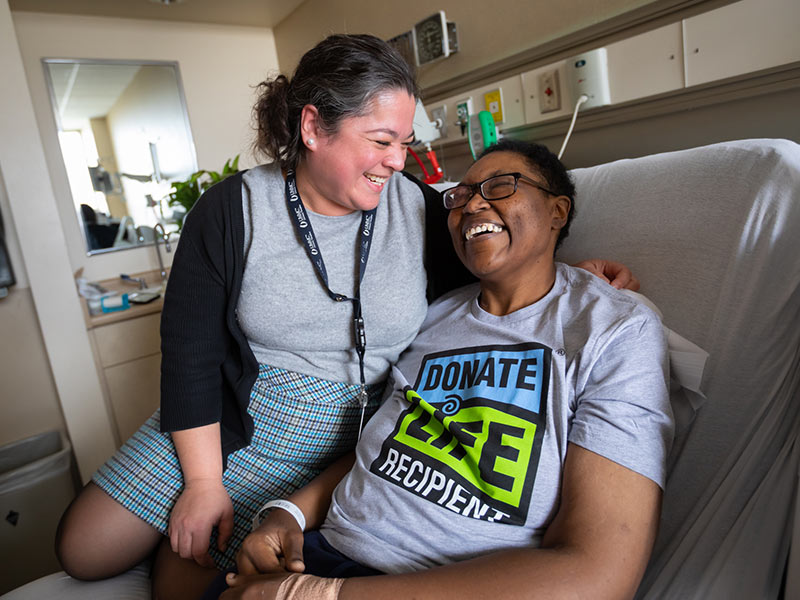
You could say 2018 was a year of medical firsts for Kimberly Cooley: Her first set of stitches. Her first trip to an emergency room.
Her first ambulance ride. Her first overnight in a hospital. “I’m usually a one-time-a-year sinus infection girl,” she explains.
Oh, and her first organ transplant, a liver to replace her scarred, diseased one, allowing her to hold fast to her nieces, nephews and other family who live within a 12-mile radius of her Duck Hill home.
“I want to embrace life. There’s a story to tell,” said Cooley, 37, an independent public relations advisor with clients in New York and Connecticut. “All of this amazing care happened in Mississippi.”
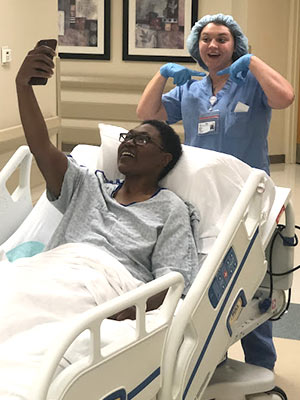
That would be at the University of Mississippi Medical Center, where she received her transplant Dec. 8, and at the University of Mississippi Medical Center Grenada, where Dr. Timothy Ragland was the first to pinpoint why her liver was going south.
Cooley’s first inkling was in December 2017. She had recently moved to Georgia. “I noticed I’d gained weight, but as women do, I chalked it up to bloating and too many Applebee’s nights.”
She went from handling three flights of stairs with ease to having trouble walking six feet. The morning of March 6, 2018, “I took a long stare in the mirror and noticed how extended my belly was.”
She went a local emergency department, where she was told the bloating was the result of a severe fluid buildup in her abdomen associated with cirrhosis, a late stage of scarring of the liver that can be caused by a number of diseases and conditions.
Because her insurance hadn’t yet transferred, “I booked it to Mississippi,” Cooley said. “The timing was critical.”
Someone suggested she see Ragland, an assistant professor of radiology. “They basically saved my life,” Cooley said of Ragland and his team. “He was the first doctor to tell me anything about my condition (autoimmune hepatitis) with confidence.”
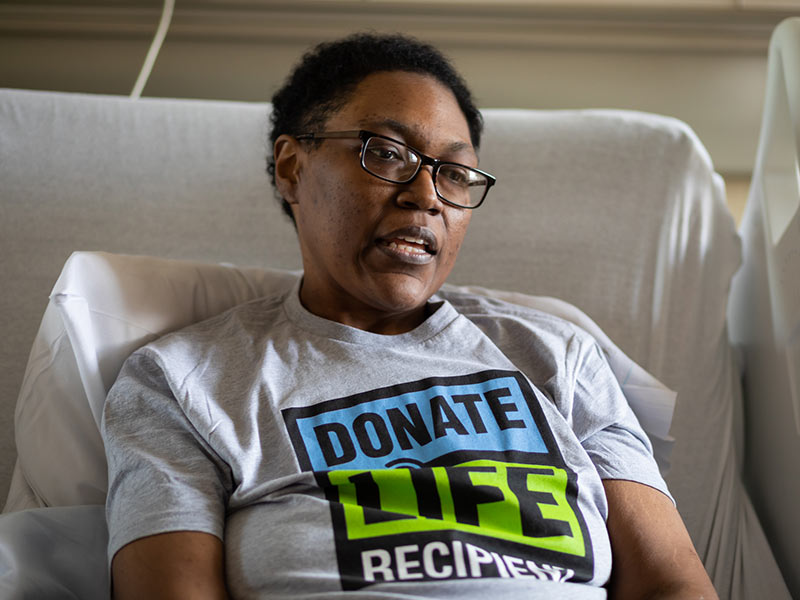
He sent her to Dr. Mildred Ridgway, assistant professor of obstetrics and gynecology, to rule out ovarian cancer. They did; Ridgway connected Cooley with Dr. Mark Earl, associate professor of transplant surgery, and his abdominal team. “It was like a real-life episode of House,” Cooley said. “They figured it out.”
The constant buildup of fluid made her weight balloon to 340 pounds; her lanky frame normally supports about 220 pounds. Dr. Thomas Amankonah, associate professor of digestive diseases, joined her care team, and through a combination of diuretics and a sodium-free diet, she lost more than 120 pounds of fluid.
Amankonah “got her so ready” for the transplant to come, said Dr. Felicitas Koller, assistant professor of transplant surgery, who with Earl performed the procedure. “She came to surgery very well cared for. This was a team effort.”
But before her transplant, a new life-threatening condition one-upped her liver failure. “I had some bad tilapia,” Cooley joked. She went to the Emergency Department at UMMC Grenada, then was transferred via ambulance to Jackson. “I was here with sepsis for a week and a half,” she remembered.
That was August; she couldn’t hope for a transplant until sepsis, an illness caused by the body’s response to an infection, had fully cleared her system. Finally, on Oct. 31, she went on the waiting list. Her transplant coordinator, registered nurse Anna McGraw, kept up with her care. “She’s my little firecracker,” Cooley said.
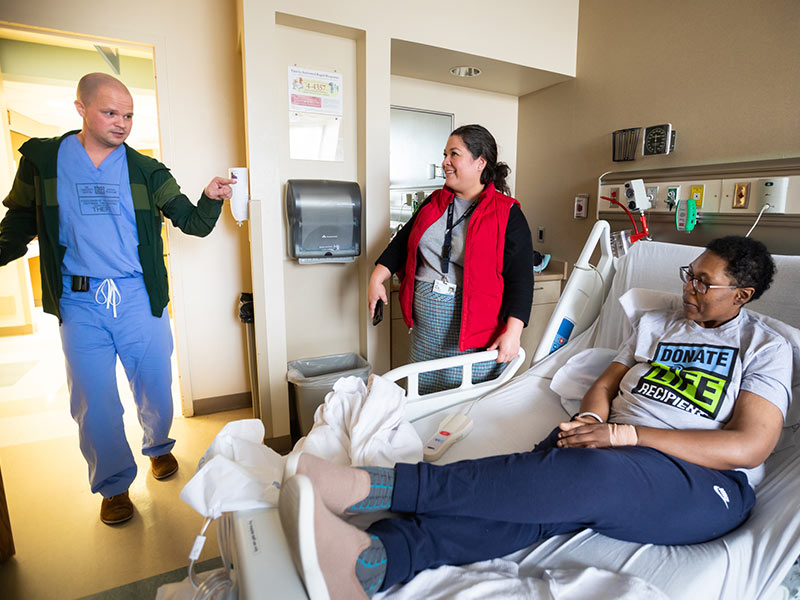
Cooley prepared her home: hand sanitizer dispensers everywhere. Spotless bathrooms. On. Nov. 25, she got the call from her transplant team with the offer of a liver, and she headed to Jackson.
When a donor is identified for a patient waitlisted at UMMC, the hospital contacts the patient and the patient can accept or decline the organ. A surgeon from the transplant team personally removes the organ from the donor, whether they’re already at UMMC or somewhere else, and brings it to the OR.
“I was locked and loaded,” Cooley said. “But when the liver arrived, Dr. (Christopher) Anderson wanted something better.
“I wasn’t disappointed,” she said. “I was grateful for his wisdom and ability to say no. I knew a better liver would come.” Anderson is professor and chair of the Department of Surgery and chief of the Division of Abdominal and Hepatobiliary Surgery.
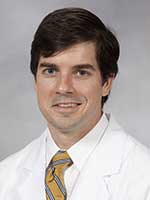
Even though an initial assessment of a potential donor organ might look good, “we take an aggressive stance,” Earl said. “We evaluate the donor and organ based on lab work and circumstances around the donor’s death, and based on that, we make a decision on whether the organ is likely to be suitable. Once we do that, we call the recipient into the hospital.”
But things can change. Surgeons might find that an organ that looked good on paper is not, or an organ that looked marginal on paper is actually excellent.
“If we make the determination that it’s unsuitable, we call it off. Most recipients are disappointed, because they’re excited about the opportunity to move beyond organ failure,” Earl said. “I’ve never spoken to a recipient who wasn’t thankful that we were making decisions to keep them healthy.”
Such was the case with Cooley’s second offer, made via a phone call from Earl. “He said they had a liver that had just come in. A young person. Drug overdose,” she said. “He wanted to have that conversation.”
She declined the organ. They both felt good about the decision.
“Through all of this, I never stopped. I didn’t succumb. I knew what I had to do,” Cooley said.
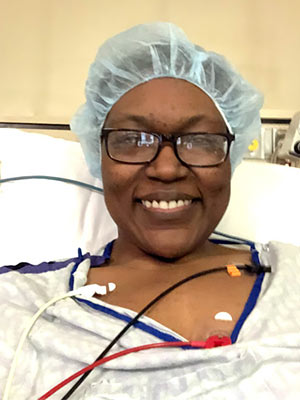
When the third offer came, at 6:19 a.m. that Saturday, Cooley was on go. In fact, after she returned home following her first organ offer, “I purged a lot from my packed bag before putting it back in the car.
“My transplant coordinator said she was so sorry to wake me up again,” Cooley said. “I said, ‘Honey, I am so over that.’ I told her I was about to start my car. That’s a benefit from the trial run.”
Cooley’s niece, Seshadrial Miers, is her deputized caregiver. The two are very close, and Cooley protected her when they traveled to Jackson. “It was rainy, and I drove,” she laughed.
Koller said that as they prepared for surgery, a troubling thought ran through her mind: Bad things can happen to good people. “So, I teased her before surgery. I asked her to tell me a few bad things she’d done in her life.
“She told me that in kindergarten, she had stolen a My Little Pony. I felt much better knowing she’d done that.”
Not quite four days after her transplant, Cooley and Miers headed back to Duck Hill. “She has at least tied our record there. Getting home four days after this surgery is remarkable,” said Steve Harvey, a nurse practitioner on the Jackson campus who will take the lead in making sure Cooley gets regular follow-up care.
“I tell my patients that if you do well, you might never see your surgeon again unless you want to,” Harvey said. “You’ll have a team of 20 people taking care of you. From evaluation for a transplant to pre-op to surgery to follow-up, we’re a big team.”
Cooley, who admits to working on her laptop in the throes of sepsis, vows to make them proud. “I’m thankful that the two campuses of UMMC are under the same university umbrella,” she said.
Miers “is the enforcer,” she said. “I want to learn how to listen to people, to chill out, and to sit my tail down. I want to get back to hanging out with my nieces and nephews.”
Cooley, Koller says, “is unstoppable.”


